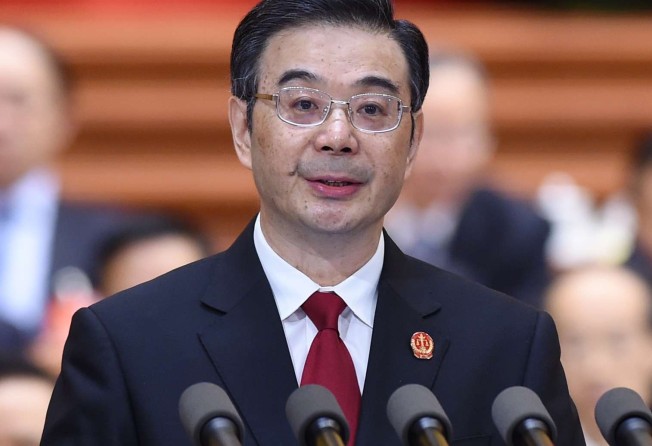Lawyers urge China’s top judge to quit over controversial comments against ‘Western’ judicial independence
Petition launched after Zhou Qiang, head of the Supreme People’s Court, tells top provincial judges to reject ‘erroneous’ Western ideas of judicial independence and separation of powers

More than a dozen former and practising Chinese lawyers have signed a petition calling for China’s top judge to resign over his controversial remarks against “Western” concepts such as judicial independence.
Supreme People’s Court Chief Justice Zhou Qiang, 57, told all top provincial judges on Saturday that they should firmly resist the “erroneous” Western ideas of judicial independence and the separation of powers.
Zhou called on the judges to reject mistaken criticism of the leadership of the Communist Party and warned them never to fall into the “trap” of embracing the erroneous Western ideas, China News Service reported.
He urged the judges to “dare to pull out their swords” to fight criticism of the party’s leading role and the development of rule by law under socialism with Chinese characteristics. Similar remarks were also reported by Xinhua late on Monday.
But a transcript of Zhou’s speech published on the website of the party’s State Organs Work Committee on Tuesday referred only to his remarks about resisting Western ideas, without mentioning the hawkish comments.
According to the transcript, Zhou’s speech focused on the need for local judges to spearhead judicial reforms.
His controversial remarks sparked criticism online on the weekend, including from members of the legal community.
Some accused Zhou of going against the spirit of judicial independence enshrined in Article 126 of the country’s constitution.
Others urged Zhou to debate them on the issue.
The Supreme People’s Court has published several articles on social media defending Zhou over the last few days.
Lin Liguo, a Shanghai-based former lawyer, who launched the petition calling for Zhou’s resignation, said yesterday that so far 19 people had signed the document, most of them practising lawyers.
“As the top judge in the country, Zhou has actually failed to live up to his position with his pledges to fight the worldwide standard of judicial independence,” Lin said.
Nanjing University Professor Gu Xiao, a specialist in the philosophy of law, said Zhou’s speech ran counter to the nation’s constitution and would affect his career. “This goes against his professional legal training in which judicial independence is vital to a nation’s rule by law,” Gu said.
“It is more of a political gesture, but it has drawn massive disagreement from the legal and academic sectors. Clearly his speech was not welcomed.
“His speech damaged our legal system built on the consensus of rule by law ... Judicial independence is clearly stipulated in our constitution and no power or personnel shall intervene in a judicial ruling.”